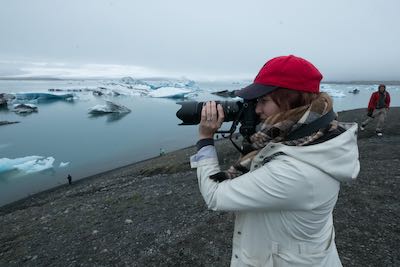
Mari Lemmie’s work with the public defender’s office wasn’t journalism, exactly. But it was pretty close—and, in its own unique way, just as consequential.
“I’m looking to get into journalism directly now,” says Lemmie, a recent graduate of the Master’s in Journalism program at Georgetown University. “But at the public defender’s service, I was working on cases where folks had been sentenced to life in prison during the crack epidemic in D.C., and at the time they were juveniles. They were kids.”
Decades later, many were eligible for release under a 2016 District law that offers resentencing to some people who were convicted of serious offenses that occurred when they were juveniles. Lemmie’s job was to make that case, in print and video, through something called a mitigation report. Much like a journalist, he delved deeply into a person’s life. But unlike a reporter, he sometimes had two years or longer to complete a profile; a journalist might get only a couple of weeks. And he didn’t need to reach a broad audience for his extensive biographies, just “an audience of one,” the only person who mattered: the judge.
A Major Issue
At Georgetown, the assignment that most resembled Lemmie’s previous job was his final project, or Capstone, in which students research a major issue over the course of several weeks and create an in-depth piece suitable for publication. Lemmie’s Capstone drew on his D.C. connections to feature the work of four community programs that support homeless, at-risk youth, and violence prevention.
The Capstone offers students the chance to synthesize what they have learned in the program, explore a topic that fascinates them, and produce a creative and incisive work of journalism that can stand on its own—all with the kind of ongoing professional feedback that is not always possible in a busy newsroom. But it can sometimes seem overwhelming for these mainly working professionals, many of whom have packed schedules and multiple responsibilities.
Capstone Advisor Jonathan Franklin, a reporter at NPR and 2018 graduate of the program, remembers this feeling well, and it helps inform his own work with students.
“I’m like an editor-advisor-emotional support person,” Franklin says, “because sometimes students will call me and be, like, ‘Oh, my gosh. I’m so stressed. I don’t know how this is going to work out,’ I’m like, ‘Okay, take deep breaths. Let’s figure out what’s most timely now’ and help them organize.”
A Flurry of Questions
Franklin, now a Race, Culture, & Identity reporter based in NPR’s Washington bureau, can recall his own moments of stress and indecision when writing his Capstone, which was about local Black churches that had become virtual mental health clearinghouses for their congregants—a departure from the more traditional view that prayer alone could solve all personal problems.
His Capstone advisor was Delece Smith-Barrow, Education Editor at Politico, and he sought her advice often.
“She helped me tremendously when I was trying to put together my project,” Franklin says. “I had so many questions: ‘How should I start this? How should I frame this? How many characters should I have? What should I do to tidy up certain sections?’ Hopefully, I didn’t get on her nerves.”
Franklin makes it a point to be as accessible to his students as Smith-Barrow was with him, giving them his cell phone number and telling them they can call anytime.
Anastasia Obis, who graduated in 2023, says Franklin’s help was invaluable. For her Capstone, she took on a complex, multifaceted story: the hollowing out of center cities before and during the pandemic and what will be needed to bring them back. Her story touched on everything from the state of the economy and commercial real estate, to zoning and housing policies, to the views of affected residents, many of whom are excluded from the high-priced housing market.
It was a lot to include—sometimes, too much.
“There’s a lot of back and forth” when discussing the story, Obis says. “You’ll have to make a lot of tough decisions writing it. You have to let go of things you really don’t want to let go of. And your editors are telling you: ‘You have to let it go. This does not serve the story.’”
A New Kind of Storytelling
Often, the Capstone takes a student in a new, uncharted direction. And other times, as was the case with Moriah McReynolds, it is the student who chooses that path. A freelance illustrator, she used a graphic novel-like format to tell the story of a young transgender homeless woman who has found a housing program in Washington designed for LGBTQ youth, who make up about 40 percent of the District’s homeless youth population.
The graphic format, which includes both text and drawing, offers a unique kind of immediacy and connection for the reader. And while McReynolds’ Capstone advisor, JC Whittington, a video journalist for Politico, did not work in this medium, she helped her with that most universal of journalistic skills: storytelling.
Whittington says that by using the more abstract graphic novel approach rather than, say, a video, McReynolds was able to offer her subject a measure of privacy while still telling a very personal and compelling story.
“Rather than resorting to intrusive video documentation during the most trying period of someone’s life, Moriah opted for a more respectful approach by engaging in meaningful conversations,” Whittington says. “Tackling the subject of homelessness in journalism is challenging, as journalists are expected to maintain objectivity even in the face of another person’s suffering. Moriah’s chosen storytelling platform facilitated ethical journalism, offering a more human perspective.”
McReynolds’ piece also shows that the art of journalism is always evolving and that there will always be many ways to tell a story.
“I was one of the first [from the program] to explore this different medium of storytelling within journalism,” she says. “And I’m sure there are other ways that other people will come to this program with ideas that I can’t even think of. So, if you have one of those ideas, don’t be afraid to be different—and go for it.”
